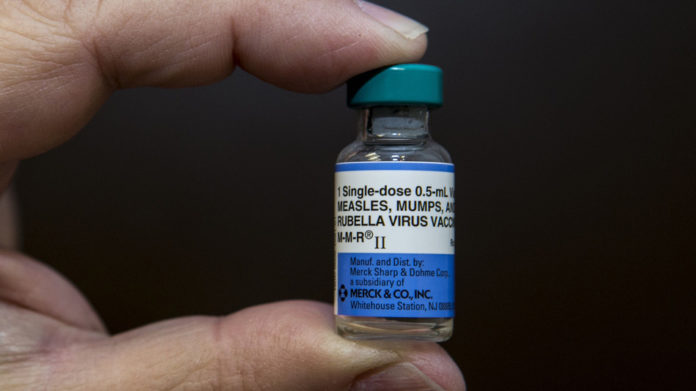University of California system to require measles vaccines following outbreak

The University of California announced Friday that incoming students will soon be required to be vaccinated for measles, a highly contagious virus that has infected more than 100 people nationwide in recent months following an outbreak linked to Disneyland.
Currently the university system, which has more than 200,000 undergraduate and graduate students spread across 10 campuses, only requires hepatitis B vaccines.
“The need is more pressing than ever, given the current multistate measles outbreak and the re-emergence of other vaccine-preventable diseases among those not completely immunized,” the university said in a statement, noting, however, that the plan for new vaccine requirements has been in the works for a year.
The majority of those who have been infected with measles, which can cause a rash, fever, red eyes, a runny nose and a cough, as well as result in pneumonia, were unvaccinated, according to the Centers for Disease Control.
The outbreak has been linked to Disneyland, with the first case emerging from the Southern California theme park in December. It has since spread to Arizona, Utah, Colorado and elsewhere. Although the measles outbreak has spread to more than a dozen states, the majority of cases—103 as of Friday— are based in California.
In addition to the measles, mumps and rubella vaccine, known as MMR, others required under the new UC plan include: meningococcus, varicella (chicken pox), tetanus, diphtheria and pertussis (whooping cough), as well as a TB screening.

Merced students lounge in the ‘lantern’, a meeting place at the heart of campus in Merced, California on Monday, April 20, 2009.
Image: Ben Margot/Associated Press
The plan may take three years to implement at campuses across the state, although individual campuses may implement it more quickly, according to the university. By fall 2015, incoming UC students will be notified of the new policy. By the following fall, students will be expected to have the vaccines, but it will not be technically required until fall 2017. Students who aren’t vaccinated by then will have a hold put on their registration.
Although the plan focuses on incoming students, the requirements may be extended to enrolled students and more vaccines may be added, Dr. Gina Fleming, medical director for the UC student health insurance plan, said in the announcement.
“Despite the fact that many people receive the recommended vaccines, there are still documented cases of outbreaks of vaccine-preventable diseases in California and on the campuses each year amongst those who were not properly immunized,” Mary Knudtson, executive director of the UC Santa Cruz Student Health Center and chair of the UC Immunization Policy Committee, said.
“All students are strongly encouraged to obtain the vaccines recommended by the California Department of Public Health prior to starting classes.”
The UC system will exempt students who have medical or religious reasons. Several parents who decide not to vaccinate their children—many because they believe debunked studies that say vaccines can cause autism— lean on state provisions that allow exemptions based on personal beliefs.
However, two California state senators said this week they plan to introduce legislation that would prevent parents from skipping vaccinations for their children due to personal beliefs and California’s U.S. senators, Dianne Feinstein and Barbara Boxer, also sent a letter this week to California’s Health and Human Services Secretary Diana Dooley to reconsider the state’s exemption rules.
“While a small number of children cannot be vaccinated due to an underlying medical condition, we believe there should be no such thing as a philosophical or personal belief exemption, since everyone uses public spaces,” Sens. Boxer and Feinstein wrote in the letter.
Have something to add to this story? Share it in the comments.
